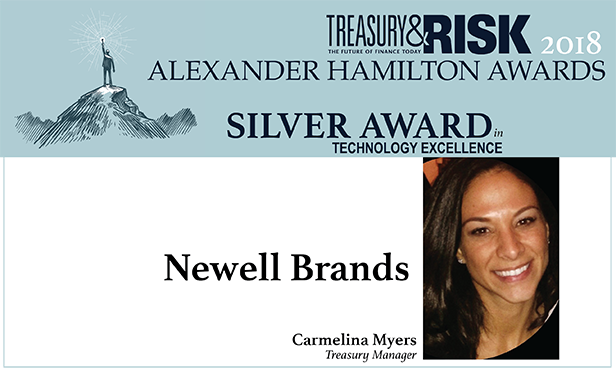
In 2015, Newell Rubbermaid sold consumer goods under a long list of leading brand names such as Rubbermaid, Sharpie, Calphalon, Paper Mate, and Elmer's. The following year, when the company merged with Jarden Corporation—owner of Yankee Candle, Oster, Rival, Marmot, Crock-Pot, and many others—it formed a consumer-goods powerhouse.
Headquartered in Hoboken, New Jersey, Newell Brands now sells nearly $15 billion of products around the world each year. Its global reach means it generates complex cash flows and substantial foreign exchange (FX) risk. Prior to the merger, both Newell and Jarden relied predominantly on outdated, manual treasury processes. Post-merger, the treasury teams found themselves grappling with even broader and more complex processes.
The company had a currency hedging program for cash flows, but it did not have a comprehensive balance sheet hedging program. “We did place some hedges, but they were one-off, for balance sheet items that were large enough and were brought to treasury's attention,” explains Carmelina Myers, treasury manager with Newell Brands. “Big intercompany loans were usually hedged because we were part of that process, but currency risks around our cash, A/P [accounts payable], and A/R [accounts receivable] usually went under the radar because we didn't have appropriate tools for gathering that data.”
Worse, when Newell did hedge FX risks, the process was largely manual. Multiple staff members worked to consolidate risk data in spreadsheets, and then executed trades by phone. Cash management was similarly out-of-date. Once a week, treasury operations staff would download prior-week data from each of the company's banking portals and export to Microsoft Excel for evaluation. From the spreadsheets, the team would generate a weekly cash report and determine each business unit's appropriate net cash sweep.
The inefficient cash reporting process consumed more than 40 hours a week of staff time, and the end result was still subpar global cash visibility. Senior management had a precise, strategic-level view of corporate cash only at quarter-end. Moreover, FX was a source of perpetual concern. “We saw an FX impact on P&L month after month,” Myers says. “There was a disconnect from the underlying items being remeasured due to the exchange rate volatility, and we didn't have the hedges to offset that.”
Newell Brands decided that end-to-end automation of treasury activities would be critical in the future. The treasurer at the time, Amit Singh, initiated a modernization project that would deploy a new treasury management system, currency risk management platform, and FX trading solution. The goals of the project were to reduce risk, improve efficiency, and provide better visibility into the organization's global risks and cash flows. To achieve these goals, the company deployed—and tightly integrated—a Kyriba treasury management system, FiREapps for currency management, and FXall trading platform.
The project team established a straight-through SWIFT connection for the majority of their bank balances. For the rest, they set up weekly reporting into the treasury management system. Newell built a weekly “push” process for cash reporting through which bank activity automatically loads into the treasury management system, where an analyst can conduct journal entry coding and quickly estimate each business unit's liquidity needs. All this automation has had a dramatic impact on efficiency. The weekly cash reporting process takes 55 percent less staff time now.
More important, though, is the impact on visibility into corporate cash flows. Business units receive a weekly report on their cash sweeps; the process of creating these reports is completely automated. And automation of bank reporting has enabled the company to receive balance updates twice a day. “At the aggregate level, we can see which entities have cash, which entities need cash, whether there are loans to be paid down, etc.,” Myers says. “Getting that visibility into cash flows across all our businesses with one press of a button is pretty amazing.”
At the same time Newell was transforming cash management, Singh's project team also developed a balance sheet hedging program. The FiREapps solution automatically pulls FX exposure data from 25 business units' 38 different legacy enterprise resource planning (ERP) systems. “All their exposures—across cash, A/P, A/R, and loans—comes through completely seamlessly,” Myers says. “Every single day we get a snapshot of what our FX risks look like across the company.”
Newell treasury uses that information to place external hedges once a month. “We hedge all our FX exposures under Jarden LLC,” Myers explains. “Every month, we adjust our positions by placing an internal hedge where needed and then hedging externally with a bank. For example, if a euro-functional entity had its dollar cash reduced that month, we'll reduce the hedge. We're still not hedging 100 percent of our exposures because there are some places, like Brazil and Argentina, where hedging is very difficult. But our new process has eliminated the vast majority of FX risk we used to carry on our balance sheet.”
The process efficiencies haven't reduced staff time spent on hedging, Myers says. Instead, they've dramatically expanded the scope of FX risks that Newell can mitigate. “Before, we had around 10 business units in our balance sheet hedging program,” Myers says. “Now, we have around 75. This volume of hedging, covering this much of our risk, wouldn't even have been possible in our prior environment.”
 Myers says one more major benefit of the technology project is that Newell treasury gained much better visibility into where its risks actually lie. “There were entities that were holding a lot of cash that treasury wasn't always aware of,” she says. “Bringing that information to the surface enabled us to learn something from the business units. Now we can hedge those risks if we need to. We can also see natural offsets that we weren't aware of before, where one business unit might be long on a currency but another business is short. We can look at eliminating those risks without putting a hedge on.”
Myers says one more major benefit of the technology project is that Newell treasury gained much better visibility into where its risks actually lie. “There were entities that were holding a lot of cash that treasury wasn't always aware of,” she says. “Bringing that information to the surface enabled us to learn something from the business units. Now we can hedge those risks if we need to. We can also see natural offsets that we weren't aware of before, where one business unit might be long on a currency but another business is short. We can look at eliminating those risks without putting a hedge on.”
By rebuilding its treasury technology infrastructure from the ground up, Newell achieved results that Singh calls “staggering.” Among them: Balance sheet losses fell from $49 million in 2014 to less than $2 million in 2017. Fees on FX trades dropped by $1.3 million in a single year. Newell gained the ability to actively manage 14 additional currency pairs. And the management team's visibility jumped from only 50 percent of global cash flows to 95 percent, increasing their confidence in decisions about strategic investments.
See also:
- Center of Excellence for Millions of Consumer Payments
- “How to Build an Innovative Treasury Function”: On-demand webcast honoring 2018 Alexander Hamilton Overall Excellence Award winner—Microsoft
- 2018 Alexander Hamilton Awards in Liquidity Management
- 2018 Alexander Hamilton Awards in Operational Risk Management & Insurance
- 2018 Alexander Hamilton Awards in Treasury Transformation
© Touchpoint Markets, All Rights Reserved. Request academic re-use from www.copyright.com. All other uses, submit a request to [email protected]. For more inforrmation visit Asset & Logo Licensing.



